Build Or Buy? Five Sub-$500 Store-Bought Systems Compared
Benchmark Results: General Performance And Content Creation
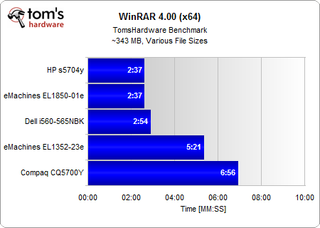
On the lower-cost end of the CPU hierarchy, AMD puts up a good fight in measures of compression performance. The S5704y's Athlon II X2 250 and the EL1850-01e's Athlon X2 255 both slightly outpace the Pentium E5800 in Dell's Inspiron i560.
At the bottom of the performance spectrum, we see Compaq's 2.0 GHz Athlon II 170 having a hard time keeping pace with the 2.2 GHz Celeron 250 in eMachines' EL1352-23e.
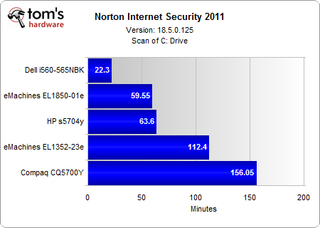

| Header Cell - Column 0 | Number of Files on C: |
|---|---|
| Compaq CQ5700Q | 264 734 |
| Dell i560-565NBK | 183 334 |
| eMachines EL1350-01e | 166 089 |
| eMachines EL1850-23e | 166 529 |
| HP s5704y | 313 075 |
All five systems ship with an OEM version of Windows 7, but the number of files on each hard drive varies due to bloatware. That's why the anti-virus experience is so different when you build your own computer. Pre-built systems usually come with lots of extra (often unwanted) software, requiring that you scan more files. This tends to translate into faster disk fragmentation. This helps explain why virus scanning is still a pain point for so many people, despite the fact that most enthusiasts with relatively clean disks don't see the same issues on their own boxes.
Besides contributing more files to the scan job, unwelcome apps on a hard drive also tend to result in more demanding anti-virus workloads. Among systems that offer similar CPU performance, scan times can be entirely different. Even though the Dell Inspiron i560 has more files to scan, it completes the task faster because more of its files are uncompressed, rather than packed archives.
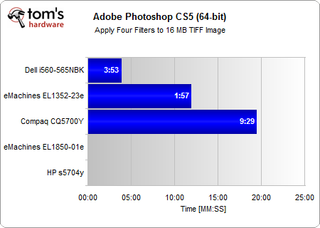
If you frequently use Photoshop, the experience clearly varies from system. Obviously, though, Dell clearly leads the pack.
More so than a processor dependency, this seems to be the result of better hard drive performance. Editing a 16 MB TIFF image requires several read/write operations to the scratch disk. Insufficient storage performance crashes our scripted benchmark on eMachines' EL1850-01e and HP's s5704y. This is a warning for those who want to short-change hard drive performance for a more CPU horsepower.
The lower-end Celeron 450 and Athlon II 170 are both able to finish this benchmark, despite each having less raw compute muscle than the Athlon II X2s used in the EL1850-01e and s5704y because both systems use better-performing hard drives.
Stay on the Cutting Edge
Join the experts who read Tom's Hardware for the inside track on enthusiast PC tech news — and have for over 25 years. We'll send breaking news and in-depth reviews of CPUs, GPUs, AI, maker hardware and more straight to your inbox.
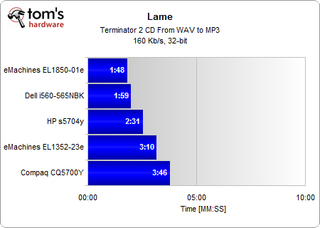

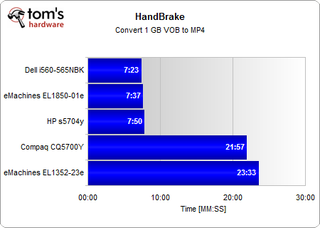
For the most part, content creation splits the systems into two distinct groups. At the higher-end, the i560, EL1850-23e, and s5704y all benefit from better CPU performance, but this only applies to encoding video.
In Blender and HandBrake, the lower-end EL1350-01e (Celeron 450) and the EL1350-01e (Athlon II 170) take 300% longer than the three other systems. When it comes to audio encoding, there is more of a linear progression from system to system.
Current page: Benchmark Results: General Performance And Content Creation
Prev Page Benchmark Setup Next Page Benchmark Results: Synthetics-
jeff77789 Also, on another note, the money that you have to pay just to get an operating system like Windows simply takes too much out of your budget if you are going for $500 as your max. i wouldn't suggest building unless your budget is >$550Reply -
JohnnyLucky Grandma's idea of gaming is a few rounds of Solitaire. The pre-builts will do for her.Reply -
cknobman hmmm what is up with the crappy big vendor choices only? If you ordered these online why not go with a "boutique" vendor.Reply
I just configured an iBuyPower rig for $489. It has Athlon X2 250, 4gb Ram, 500GB HDD, 500w Power Supply, Liquid cooling, Radeon 6570. For $24 more bucks I could get a 6670.
I know its not a killer machine but it puts these big box vendors to shame. -
sinfulpotato On a real budget I wouldn't get a 6850. Even more so if you are staying below 500 clams. There are power house GPUs that can be had for less then 100 dollars. My 4850 still runs strong and as shown by Tom's very own review a Athlon x4 will compete with the Phenom x4.Reply
Also if you already have windows OEM you can get it reactivated on a new PC if you get the right Microsoft rep, also lie about motherboard dieing and not replaceable... Some will choke up a code. -
lordravage I have a real problem with this article. It isn't comparing a $500 prebuilt system to a $500 home build at all. It compares 5 computers from Best Buy that range from $299 to $409, versus a $500 machine that lacks an OS, mouse and keyboard. Factor everything in and the home build costs almost TWICE as much as the cheapest competitor.Reply
I know you mentioned the discrepancies in the article, but if you aren't going to try a little harder to make a good comparison you shouldn't even make the article. Shop around online at better retailers than Best Buy, find the very best systems you can that cost about $550, THEN compare those to your own system.
I still expect the prebuilt systems to fall behind, but the article we have here isn't even a real comparison. -
deadcold94 constructive criticism but on i think its page 5 your adobe photoshop graph has a 1 instead of an 11. thanks for fixing it; when and if your do.Reply
sincerely,
Mackenzie -
JOSHSKORN If you're a serious FPS gamer, don't waste your money on a pre-build. Do the research and have a computer built for you or build it yourself. You'll spend the same price most likely and come out with a much better machine. The difference is the cost of the name brand.Reply -
cmcghee358 Why wasn't the $500 Homebuilt PC placed on the chart to show comparison?Reply
All you did was compared the systems performance and then list the Custom-built specs at the end without any benchmark comparison.
I was going to use this article for ALL of my friends to understand why they should build their own. But, since you guys compared the rainbow of feces available at Best Buy without showing the splendor that is home build, it's useless.
Come on...
Most Popular

